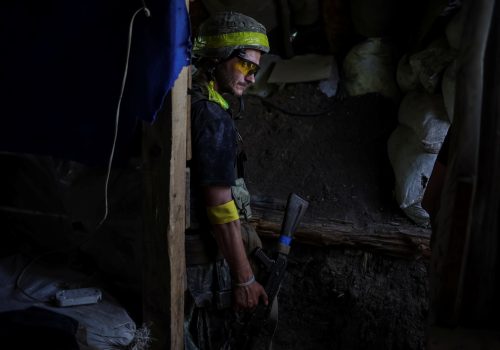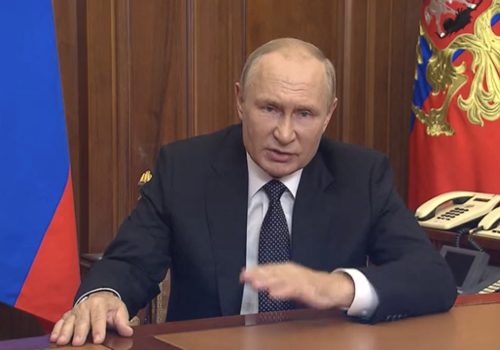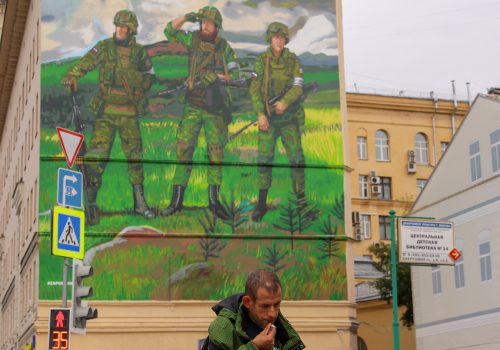FAST THINKING: What to make of Putin’s nuclear threats
JUST IN
An escalation born of desperation. That’s the framing Lithuanian President Gitanas Nausėda offered today, during an Atlantic Council event on the sidelines of the UN General Assembly, just hours after Vladimir Putin once again warned the world that he could resort to nuclear weapons to defend what he believes is rightfully Russian territory. With the Kremlin now apparently poised to annex the Ukrainian land it currently occupies—and amid Putin’s announcement that he will call up extra troops to wage his war following battlefield setbacks—the conflict in Ukraine may be entering an even more dangerous phase. Russia’s leaders are making these moves, Nausėda argued, “because they are losing.” We turned to our experts for more insight and intel.
TODAY’S EXPERT REACTION COURTESY OF
- Matt Kroenig (@MatthewKroenig): Acting director of the Scowcroft Center for Strategy and Security and former nuclear-weapons expert in the US Department of Defense and intelligence community
- Melinda Haring (@melindaharing): Deputy director of the Eurasia Center
- John Herbst (@JohnEdHerbst): Senior director of the Eurasia Center and former US ambassador to Ukraine
Last card left
- Putin “is drawing on the only tools he has left,” Matt notes, but that doesn’t mean we should simply dismiss the Russian leader’s rhetoric: “If facing the real, imminent prospect of losing the war, he is likely to use nuclear weapons first before being defeated” in an effort “to turn the tide of the battle.”
- Melinda tells us that if the Kremlin were to proceed with annexing Russian-held parts of eastern and southern Ukraine—where sham “referendums” on joining Russia are expected to be held into next week—Putin would likely be “extending the Russian nuclear umbrella” over those areas. But she adds that this is “a decision that Ukraine will never accept.”
- And that raises an as-yet-unanswerable question that’s on everyone’s mind, adds Melinda—who is just back from a trip with John where they met with top officials on the ground in Ukraine: “What happens when Kyiv attempts to retake its territory?”
Subscribe to Fast Thinking email alerts
Sign up to receive rapid insight in your inbox from Atlantic Council experts on global events as they unfold.

What’s next for the West?
- Putin’s latest threats put policymakers in the United States and Europe in a tight spot, Melinda says. Russia’s “nuclear blackmail raises thorny decisions for Western leaders and the prospect of some uncomfortable brinkmanship.”
- Matt, who recently wrote a memo on how the US government should deter Russian nuclear use and respond if deterrence fails, advises taking “Putin’s nuclear threats seriously” but nevertheless keeping calm and carrying on: Kyiv and Washington “should double down to win the war” rather than “backing down to avoid a nuclear attack.” After all, he asks: “Why hasn’t Putin used nuclear weapons already? He has been deterred by fear of a US and NATO response. The United States and NATO should play on those fears and reinforce their deterrent threats.”
- Today’s White House statement warning that Russian nuclear use would provoke “severe consequences” was “on point,” Matt says. If Moscow opts for the nuclear option, he adds, the United States should carry out a “limited conventional military strike on the Russian forces that launched the nuclear attack.” Kyiv, meanwhile, should keep fighting on to achieve victory.
A bright spot in a dark hour
- Despite the ominous signs, John tells us that Putin’s latest announcements amount to “an escalation, but a careful one.”
- For one, the mobilization of up to 300,000 Russian reservists, which “sounds dramatic,” includes only those with prior military service, John notes. “So Putin continues to avoid the political risk of declaring war officially and pulling in recruits from Russian cities across the country.”
- As for the prospect of a nuclear attack, John points out that Putin “only implies, but does not explicitly state, that nuclear weapons would be used if Ukraine continues to attack Russian forces on Ukrainian land” that the Kremlin claims as its own. John also reminds us that the Ukrainian military has already struck Russian-annexed Crimea in recent weeks: “Yet we have seen no mushroom cloud.”
Further reading
Tue, Aug 23, 2022
Six months, twenty-three lessons: What the world has learned from Russia’s war in Ukraine
New Atlanticist By
Our experts break down how this conflict has transformed not only military operations and strategy, but also diplomacy, intelligence, national security, energy security, economic statecraft, and much more.
Sun, Sep 18, 2022
As Putin escalates his war against Ukraine, the world faces a moment of maximum danger—and maximum opportunity
Inflection Points By Frederick Kempe
The United States and its allies must openly discuss the dangers Putin’s war poses to any sovereign country.
Wed, Sep 21, 2022
Putin just escalated his war in Ukraine. Here’s your expert guide to what’s coming next.
Experts react By
As Putin mobilizes his reserves, moves to annex Ukrainian territory, and doubles down on his nuclear threats, our experts weigh in.
Image: Russian President Vladimir Putin attends a meeting in Veliky Novgorod, Russia, on September 21, 2022. Photo by Gavriil Grigorov/Pool/via Sputnik/REUTERS


